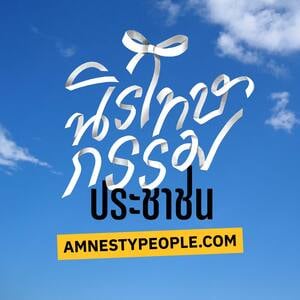
On 12 December 2013, the Criminal Court in Bangkok read a verdict on the case in which Mr. Kittithon, aka “kenji”, posted a message deemed defamatory to the King and the Queen of Thailand in dangdd.com or internetfreedom website. The accused was convicted to jail term by Article 112 of the Penal Code in combination with Article 14(2)(3) of the Computer-related Crime Act 2007, on two counts, each for five years.
In addition, Mr. Kittithon was found guilty of “preparing and attempting” to commit an act to defame, insult, or threaten the King, the Queen or the Heir-apparent. The latter conviction was related to images of the King, the Queen, Princess Sirindhorn, Princess Chulabhorn and the Crown Prince posed in various gestures and locations and the captions allegedly written by the accused which are deemed to defame or threaten the Royal Family. It was alleged that all the images and captions were stored in an electronic device which can be connected to internet and can potentially be spread in the online world. In the plaint, it was described that the accused had already committed the offence, though he did not achieve the results as the police have made a raid and seize the material prior to his being able to post them in the internet. Thus, the accused was found guilty of violating Article 112 and was to serve three years and four months on this count.
In total, Mr. Kittithon was condemned to 13 years and 4 months, but owing to his confessions to all charges at the investigation process and the trial, his punishment is therefore reduced by a half to five years and 20 months.
[For more detail of the verdict, please click here]Self confession does not automatically prove the guilt; the Court is obliged to apply the law correctly
It is generally held that the Court is an adjudicator and applies the law in accordance with the facts established. In other word, the Court’s duty is to explain how the act of the accused is a violation of a specific law, in order to answer the question if the accused has really committed an unlawful act.
That the accused confessed to the charge at the trial means he has admitted to committing the act as described by the plaintiff in the plaint and he has certified that what he said is true. Thus, no more investigation of the “facts” remains. The Court may rely on the facts proposed by the plaintiff in the plaint to examine and make his ruling. Still, the Court is obliged to contextualize the facts against the existing legal provisions in order to ascertain as to which legal provisions have been flouted.
For example, in the prosecution on Article 112, even though the accused has confessed to the charges, the Court is still obliged to review if the acts to which the accused has admitted to have committed can be deemed an act to “defame, insult, or threaten” the persons the legal provision intends to protect or not. If the acts of the accused still deviate from the elements of the crime, even though the accused has confessed to committing it, the Court has to dismiss the case.
But in the ruling against Mr. Kittithon, the Court fails to contextualize the facts against the legal provision. It simply notes briefly that the act of the accused is found a violation of a certain Article, but does not provide any clear reasons.
“Preparing to” defame is not a legal offence
In the plaint, the public prosecutors describe that the accused was preparing to commit an offence against the Constitutional Chapter on national security. But such an act could only be deemed an offence after the “wrongdoing has been committed”. An attempt to commit an act cannot be deemed an offence.
There are certain attempted acts which are construed as a criminal offence, but they have to be provided for by specific legal provisions, for example, Article 107 on regicide, Article 107 on treason, Article 114 on terrorism coupled with Article 135/2 (2) or Article 219 on arson, etc.
Even though Article 112 is included in the Chapter on national security, and several offences in this Chapter include an attempted act, but since there is no existing specific law to criminalize an “attempt” to commit an offence against Article 112, the preparation of the accused in this case cannot be construed as an offence against any law as described by the public prosecutors. The Court is obliged to contextualize the facts against the legal provision, but in this case, the Court fails to examine the illegality of an attempted act.
“An attempt to defame the monarchy”, a new standard of ruling
As the offence related to “preparation” is provided for by specific laws, but the offence of an “attempted act” provided for in Article 80 of the Penal Code is different.
“Article 80: Whoever commences to commit an offence, but does not carry it through, or carries it through, but does not achieve its end, is said to attempt to commit an offence.
Whoever attempts to commit an offence shall be liable to two-thirds of the punishment as provided by the law for such offence.”
It should be noted here that an act that could be deemed an offence must have been “carried out”. But any act which has been partially committed, i.e., someone deceives another person asking him to bring the money, but on that day the deceiver is not available so he does not get the money. Such an act fails to meet all the elements of an act of fraud, but it is still an attempt to commit a fraud, though the act has failed to get through. Or even it “has been carried out, but it has failed to achieve the intended end. For example, a person shot his opponent, but the latter’s life has been saved by doctor. Though the act has failed to meet all the elements of crime on murder, but it is considered an attempted murder, as the act has been completely been committed, though it has failed to achieve the intended results.
As for an offence related to Article 112 which is composed of an act of “defamation”, “insulting” and “threatening”, on defamation, an act has to result in the “slighting” of a person through a third party. On the insulting and threatening counts, the act must include an “expression” of an ill feeling in order to ascertain that the offence has been carried out.
In this case, the public prosecutors describe in the plaint that as the accused has in possession images and captions which are deemed to defame, insult, or threaten the Royal Family, and are ready spread it in the internet, he is thus deemed to have committed the offence, though he has failed to achieve the intended results because of the police’s intervention to search and seize all the images and captions. Such discretion should not be correct since even though the accused “has in possession” and “writes” captions, but there is no other information to indicate that he is going to spread, disseminate or commit defamation among the audience. Therefore, such an act cannot be construed as the completion of an offence but with the results are not achieved. In fact, the accused has committed no offence at all.
To hold the accused accountable for an offence already carried out and to accuse him of committing an illegal attempted act, the accused must have completed the “final stage” of the offence, i.e., by posting the material into the internet, but due to some technical glitches, the posting has failed. Or he must have sent it to somebody else who is not able to read Thai and fail to understand the content, etc.
The facts described by the public prosecutor do not suffice to hold the accused accountable for the act since he has yet to commit the final stage of the offence against Article 112 and no results have been achieved. The accused simply have in possession images and captions, which he may have for other purpose. Or maybe, he was on the verge of changing his mind and not to post the images and captions. Thus, he cannot be found guilty on committing an attempted offence against Article 112 coupled with Article 80.
In conclusion, that the accused has in possession images with captions is not tantamount to an attempt to commit an offence against Article 112. Even though it can be construed that the act of the accused was a preparation to commit an offence, but since there is not specific law to provide for a preparation act to violate Article 112, his act is therefore not actionable. And even though the accused has confessed to committing the act as per the charges, the Court is still obliged to examine the facts in light of the existing law to verify if he has committed any offence against any particular laws. As the Court in this case has simply convicted the accused according to the charges without referring to any laws should be considered not in compliance with the laws.
RELATED POSTS
No related posts
















